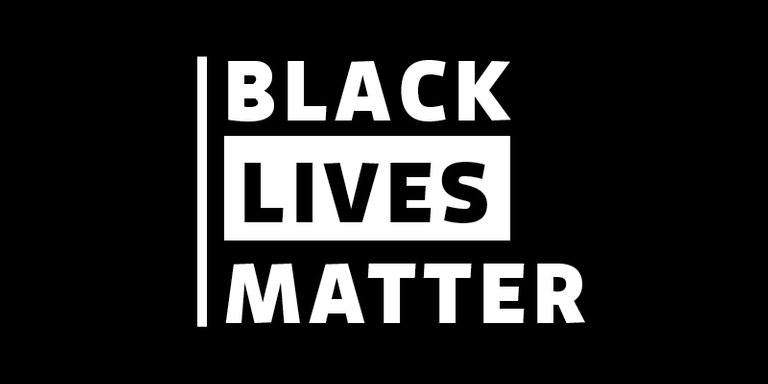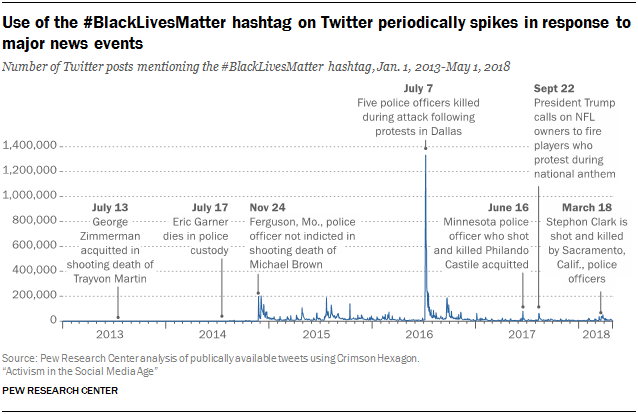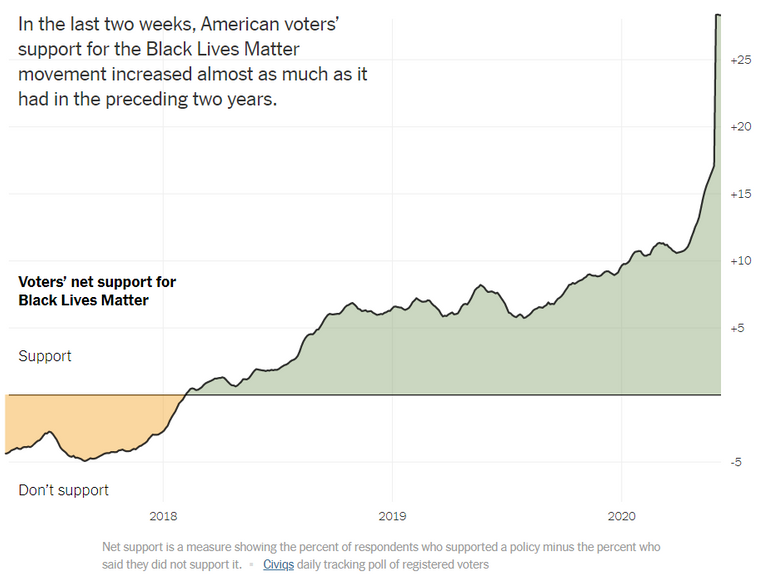
No hashtag has made such a boom in recent years as #BlackLivesMatter. What started on the internet grew into a global protest movement. But what are the chances of such an online revolution succeeding?
"Please, I can't breathe." It was the last sentence uttered by American George Floyd when a cop put his knee on his neck for minutes on May 25, 2020. Floyd died. We didn't just read that in the newspaper later, we could see it all. 17-year-old Darnella Frazier filmed the event and posted the video on Facebook, unaware that that one push of the record button would unleash an unprecedented wave of protests against racism and police violence. The video of 8 minutes and 46 seconds went viral on social media. Global protests, supported by the Black Lives Matter movement, followed.
In the aftermath, the question arises of how many people's deaths, unlike George Floyd, were not recorded on camera. Can you list their names? Probably not. When this gets through, we can't help but reflect on the role of social media in the emergence of protests. Are they an important catalyst for protest? And what is their long-term influence?
The BLM protests owe their name and fame in part to the new media. What started as a hashtag has now grown into a social (protest) movement, with worldwide fame. "We don't deserve to be killed with impunity. We need to love ourselves and fight for a world where Black lives matter. Black people, I love you. I love us. We matter. Our lives matter." These are words from the 'open love letter to black people' that American human rights activist Alicia Garza posted on her Facebook page in 2013. With the text she wanted to express her powerlessness about the acquittal of neighborhood watchman George Zimmerman. The year before, he shot and killed the black teenager Trayvon Martin because he saw him as a gangster. Zimmerman invoked self-defense and went free. Martin was unarmed. The verdict was harsh on many Americans. Thousands of people took to the streets to protest.
Black Twitter
Back to Alicia Garza's open letter on Facebook. American activist Patrisse Colors shares Garza's Facebook post. She's the first person ever to add the hashtag #BlackLivesMatter. Both ladies don't realize it, but that's when - in 2013 - the BLM movement is born. The hashtag only goes viral after being picked up by 'Black Twitter', a subculture on the social networking site Twitter.
The fact that we are talking about 'Black Twitter' and not 'Black Instagram' or 'Black Facebook' is not coincidental. African-Americans are strongly represented on Twitter. No less than a third of Afro-American internet users are active there, as opposed to a fifth of white Americans. Figures from a study conducted by the Pew Research Centre in 2015 show this. On Black Twitter they enter into dialogue with each other about culture, race and identity. It is a platform for protest and for hope. It draws attention to police violence, inequality issues and institutional racism in the US. In addition, 'Black Twitter' also focuses on celebrating black culture. By sharing playful videos and photos, users try to compensate for the lack of diversity in popular media culture.

Statistics from Twitter, published by the PEW Research Center in 2018, show that the hashtag #BlackLivesMatter was shared on average thirty times a day after the death of Trayvon Martin. A year later, the hashtag gained momentum after U.S. agent Darren Wilson shot the unarmed black teenager Michael Brown. #BlackLivesMatter appeared on Twitter an average of 58,747 times a day in the weeks following Brown's death. In the ten days after Floyd's death, the hashtag was used no less than 47.8 million times...
Paradox
Millions of social media users stumble over each other to express their support for the BLM movement. On 5 June 2020, a weekend of global protest will start. For the first time, the movement will be imitated on a global scale. By bringing the theme to millions of screens around the world, social media have contributed to spreading the protest fire.
The key question remains whether BLM, thanks to its activities on social media, has been able to initiate social and political change itself. According to sociologists Mehmet Fatih Yigit and Bulent Tarman, social media are the most effective tools for managing social change. Techno-sociologist Zeynep Tufekci thinks differently. "Technology strengthens social movements, but paradoxically, it weakens them in the same way."
Tufekci makes the comparison with fifty years ago. Back then, it was still hard work to get a protest movement going. In 1955, Rosa Parks was arrested for refusing to give up her seat on the bus to a white passenger. To enable a boycott of public transport as a protest, fifty-two flyers had to be printed manually with a stencil machine and then distributed one by one. Today, with just a few clicks, you can create a Facebook event that thousands of people can attend. According to Tufekci, it was precisely the labour-intensive logistic tasks that made a movement strong. "This created an organization of people who could think together, collectively take difficult decisions, reach consensus, innovate and most importantly: move forward together despite all the obstacles."
Limited impact
Political scientist Jonathan Pinckney, who participated in a Harvard study on the effectiveness of street protests in 2017, also sees the ambiguity of social movements such as BLM, which are growing in size in no time thanks to social media. "A fast-growing protest is not the same as creating a strong movement with a sustainable constituency, infrastructure and strategy. Of course, a rapidly emerging, large protest movement makes an impression,but politicians know that there is no organization behind it with the strength to persevere in the long term. So they can just wait for it to blow over. Mobilizing a huge group of people quickly is clever, but not enough for a successful protest". Will BLM not have a major impact in practice due to a lack of organization and hierarchy? A large social media network with weak ties. Is that how we should summarize BLM?
Sander Van Haperen, who did his PhD with a study on the role of social media in BLM's protests, nuances. In his PhD thesis Van Haperen concluded that protest movements such as BLM are no less close by the use of social media. Group formation would not have changed fundamentally. However, there are more reasons to join a protest. Moreover, local 'offline' conditions and networks remain important. "Social media are a reflection of our social networks and most of the contacts we have with people in the neighborhood. Although in theory it is possible to reach much larger groups of people through social media, in practice protest is growing simply through local communities."
Time for change?
But is that enough to actually change the system? The New York Times journalist Nate Cohn already saw a slight shift in one of his articles. Cohn is mainly concerned with elections, opinion polls and demography. For The Upshot, a website of The New York Times that combines data visualization with conventional journalistic news analysis, he examined how public opinion about BLM has evolved. He comes up with striking figures.
A study by Civiqs shows that in the two weeks after the video with a suffocating George Floyd spread via social media, support for BLM among American voters increased almost as much as it had in the preceding two years. In addition, the weekly opinion polls from the University of Los Angeles (UCLA) also showed a significant increase in engagement. On the one hand, in the aversion to the police, on the other hand in the conviction that Afro-Americans experience a lot of discrimination.
According to Cohn, the most important thing is that an opinion poll by the University of Monmouth showed that 76 percent of Americans consider racism and discrimination to be a big problem. An increase of 26 percent in two weeks. In addition, the polls showed that a majority of Americans believe that the police use rather lethal force against African-Americans, while in 2013 - when BLM began - a large majority of voters disagreed with this statement.
Another study is that of the Pew Research Center from 2014. It found that 23 percent of social media users in the U.S. say that social media has changed their opinion on political issues - including BLM. From this, we could conclude that the BLM movement, thanks to its wide reach on social media, has had a significant impact on public opinion.
Echo chambers
But there is also bad news. Social media are not only a blessing for democratic protest. According to Vyacheslav Polosenski, researcher at the Oxford Internet Institute, social media bring both new opportunities and threats:
While social media platforms like Facebook and Twitter generally have the power to expose us to politically diverse opinions, research suggests that the filter bubbles they sometimes create are, in fact, exacerbated by the platforms’ personalization algorithms, which are based on our social networks and our previously expressed ideas.
This means that instead of creating an ideal type of a digitally mediated “public agora”, which would allow citizens to voice their concerns and share their hopes, the internet has actually increased conflict and ideological segregation between opposing views, granting a disproportionate amount of clout to the most extreme opinions.
